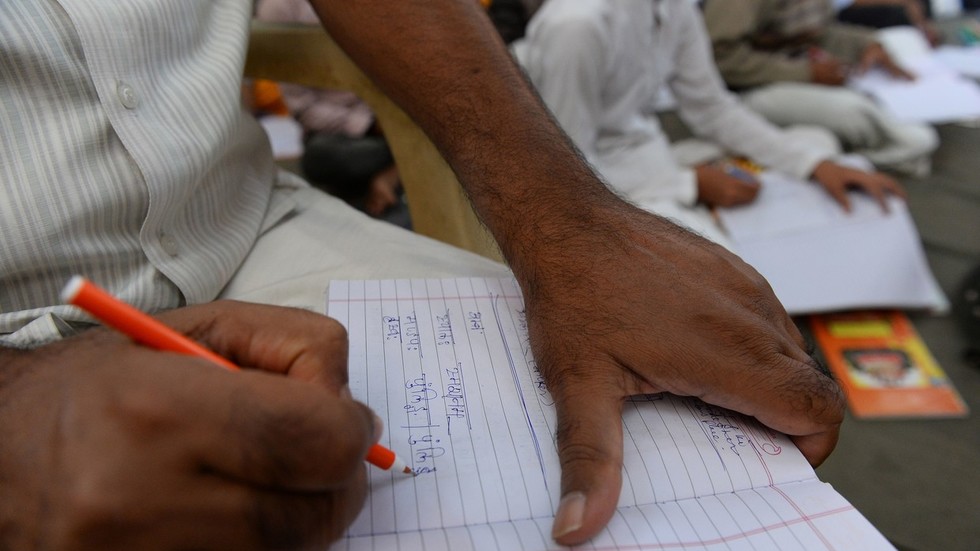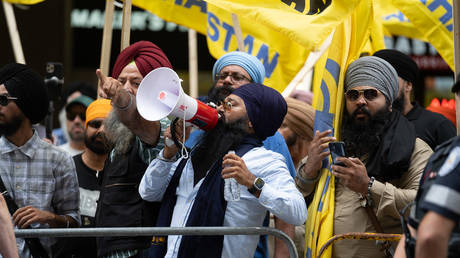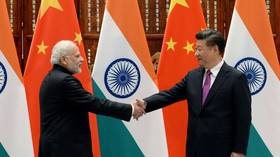Spirited debate in India over govt call for new Sanskrit-ONLY villages

The Indian government has floated the idea of establishing two new villages inhabited exclusively by Sanskrit speakers. The push to promote the ancient sacred language – spoken by some 25,000 – has ignited a national debate.
India’s minister for Human Resource Development, Ramesh Pokhriyal, proposed the idea this week, saying that the new villages should be located near the language institutes dedicated to language preservation.
Union HRD Minister Ramesh Pokhriyal Nishank (@DrRPNishank) on Thursday stressed that at least two Sanskrit-speaking villages should be developed near the central language institutions in order to promote and preserve the language.https://t.co/XoD3yAUYN4
— TIMES NOW (@TimesNow) June 14, 2019
Sanskrit is over 3,500 years old, and is the main language of Hindu philosophy and also the major textual canons of Buddhism and Jainism. The language is studied over 50 million pupils in Indian schools but only around 25,000 people speak it as their mother tongue.
Pokhriyal emphasized the need to hire more Sanskrit teachers and university professors, in order to revive the language within India and promote it at the international level. He added that his ministry plans to establish a center – Bhasha Bhawan – in which institutes representing all Indian languages will have their own office.
Also on rt.com Sanskrit shocker! Claims of 7,000yo inter-planetary planes shake up Indian Science Congress
The plan has touched off a spirited debate on social media, with some Indians expressing skepticism that the proposal represents a wise use of public money, considering that there are five Sanskrit-only villages in India already.
MATTUR is one of the 5 villages in India using sanskrit for general communication. Others are
Hosahalli(KA)
Jhiri(MP)
Mohad(MP)
Baghuwar(MP) pic.twitter.com/zlw7oB92Ea
— Vivek Tyagi (@tyagi_vic) May 12, 2017
Another line of criticism was that trying to promote widespread use of Sanskrit was “a fool’s idea” because it is “God’s language” that common people cannot understand.
Sanskrit was never used as mass speaking language. An attempt to start it on model villages will be a fools idea. As God's language Sanskrit has prevented common man to understand essence and teachings of ancient Rishis. This knowledge has remained inside intelligent people.
— S Samanta (@suksa) June 14, 2019
Others, however, praised the plan as bold step to promote an important part of Indian culture.
Dear Sir, Herein I render my respect to Your for Your Nobel gesture to developed two villages in India to give Top priority & importance to our old & indigenous Sanskrit Language. Please be Active in this regard until & unless You reach to targeted Goal. https://t.co/PxihHpQq6R
— Probir Bose (@PBose52) June 14, 2019
Pokhriyal’s initiative falls under the conservative, traditionalist and Hindu nationalist platform of the ruling Bharatiya Janata Party. Its efforts to promote Indian culture as a way of resisting westernization have led to electoral triumph, but also criticism for implicit sectarianism against India’s marginalized Muslim minority.
Think your friends would be interested? Share this story!


